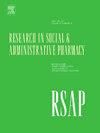The medication-related burden quality of life (MRB-QoL) Arabic tool: Exploratory factor analysis and psychometric evaluation
IF 3.7
3区 医学
Q1 PUBLIC, ENVIRONMENTAL & OCCUPATIONAL HEALTH
Research in Social & Administrative Pharmacy
Pub Date : 2025-04-10
DOI:10.1016/j.sapharm.2025.04.001
引用次数: 0
Abstract
Background
The Medication-Related Burden Quality of Life (MRB-QoL) is a patient-reported measure of medicines burden on functioning and well-being in people with long-term conditions (LTCs). The Arabic version has demonstrated good content validity; however, no data is available on its other psychometric properties.
Objectives
To evaluate the reliability and validity of the Arabic MRB-QoL tool.
Methods
Four hundred patients (≥18 years) with LTCs were recruited from a tertiary hospital in the United Arab Emirates. Exploratory factor analysis (EFA) was performed using Principal Axis Factoring for extraction and Oblimin rotation. Cronbach's alpha, intraclass correlation coefficient (ICC), and minimum detectable change (MDC) assessed internal consistency, test-retest reliability, and measurement error, respectively. Structural, Known-group, convergent, and discriminant validity were evaluated using EFA, Mann Whitney U test, and Spearman's rank correlations tests, respectively. Convergent validity (r > 0.3, moderate to high correlations) and discriminant validity (r < 0.3, weak correlations) were examined through correlation with the Medication Regimen Complexity Index (MRCI), Drug Burden Index (DBI), and 12-item Short Form Health Survey (SF-12) measures. Known-group validity was assessed by comparing MRB-QoL scores across clinically diverse groups.
Results
EFA revealed a 31-item, four-factor structure accounting for 78.5 % of the variance. Reliability results showed good internal consistency (Cronbach's α = 0.973) and test-retest reliability (ICC = 0.994). The MDC for the total MRB-QoL was 3.89, indicating that a change of more than 4 points between 2 measurements reflects a true difference with 95 % confidence. There were weak correlations between domains of MRB-QoL and MRCI (r 0.120 to 0.152) indicating discriminant validity. Correlations between the mental component summary of the SF-12 and MRB-QoL (r = −0.387) and its domains (r −0.357 to −0.374) suggested convergent validity. Patients with polypharmacy and multimorbidity had higher median MRB-QoL scores, showing known-group validity.
Conclusion
This study demonstrated that the Arabic MRB-QoL is a valid and reliable medication-related burden (MRB) measure with good construct validity, including structural, known-group, convergent, and discriminant validity. It also shows excellent reliability, with high internal consistency, low measurement error, and good test-retest reliability. These findings support its use as a psychometrically robust measure for assessing MRB and facilitating person-centred medicines optimisation services in Arabic-speaking populations.
药物相关负担生活质量(MRB-QoL)阿拉伯语工具:探索性因素分析和心理测量评估
药物相关负担生活质量(MRB-QoL)是患者报告的药物负担对长期疾病患者(LTCs)功能和福祉的影响。阿拉伯文版本内容效度较好;然而,没有关于其其他心理测量特性的数据。目的评价阿拉伯语MRB-QoL工具的信度和效度。方法从阿联酋某三级医院招募400例(≥18岁)LTCs患者。探索性因子分析(EFA)采用主轴因子提取和Oblimin旋转。Cronbach’s alpha、类内相关系数(ICC)和最小可检测变化(MDC)分别评估了内部一致性、重测信度和测量误差。结构效度、已知组效度、收敛效度和区别效度分别采用EFA、Mann Whitney U检验和Spearman秩相关检验进行评估。收敛效度(r >;0.3,中至高相关)和区分效度(r <;0.3,弱相关)通过与用药方案复杂性指数(MRCI)、药物负担指数(DBI)和12项简短健康调查(SF-12)措施的相关性进行检验。通过比较临床不同组的MRB-QoL评分来评估已知组效度。结果分析结果显示了一个31项、4因素结构,占方差的78.5%。信度结果具有良好的内部一致性(Cronbach’s α = 0.973)和重测信度(ICC = 0.994)。总MRB-QoL的MDC为3.89,表明两次测量之间超过4点的变化反映了95%置信度的真实差异。MRB-QoL的域与MRCI之间存在弱相关性(r = 0.120 ~ 0.152),提示区分效度。SF-12和MRB-QoL的心理成分摘要(r = - 0.387)及其域(r = - 0.357至- 0.374)之间的相关性表明收敛效度。多药多病患者MRB-QoL中值较高,显示已知组效度。结论阿拉伯语MRB- qol是一种有效、可靠的药物相关负担测量方法,具有良好的结构效度、结构效度、已知组效度、收敛效度和判别效度。具有良好的信度,内部一致性高,测量误差小,重测信度好。这些发现支持将其作为一种心理测量学上可靠的措施,用于评估MRB和促进阿拉伯语人群中以人为本的药物优化服务。
本文章由计算机程序翻译,如有差异,请以英文原文为准。
求助全文
约1分钟内获得全文
求助全文
来源期刊

Research in Social & Administrative Pharmacy
PUBLIC, ENVIRONMENTAL & OCCUPATIONAL HEALTH-
CiteScore
7.20
自引率
10.30%
发文量
225
审稿时长
47 days
期刊介绍:
Research in Social and Administrative Pharmacy (RSAP) is a quarterly publication featuring original scientific reports and comprehensive review articles in the social and administrative pharmaceutical sciences. Topics of interest include outcomes evaluation of products, programs, or services; pharmacoepidemiology; medication adherence; direct-to-consumer advertising of prescription medications; disease state management; health systems reform; drug marketing; medication distribution systems such as e-prescribing; web-based pharmaceutical/medical services; drug commerce and re-importation; and health professions workforce issues.
 求助内容:
求助内容: 应助结果提醒方式:
应助结果提醒方式:


